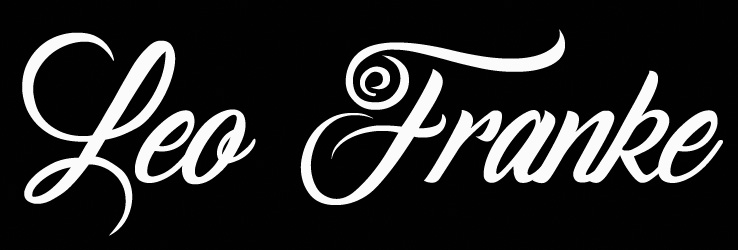
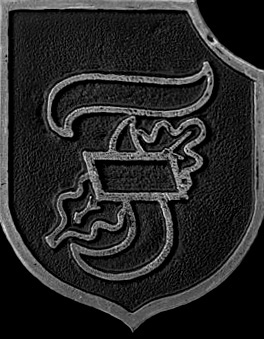
Interview with German Cross in Gold winner Leo Franke, SS-Hauptscharführer of the 10. SS-Panzer Division 'Frundsberg'. Franke was also the winner of the coveted Honor Roll Clasp award. Dortmund, 1983.
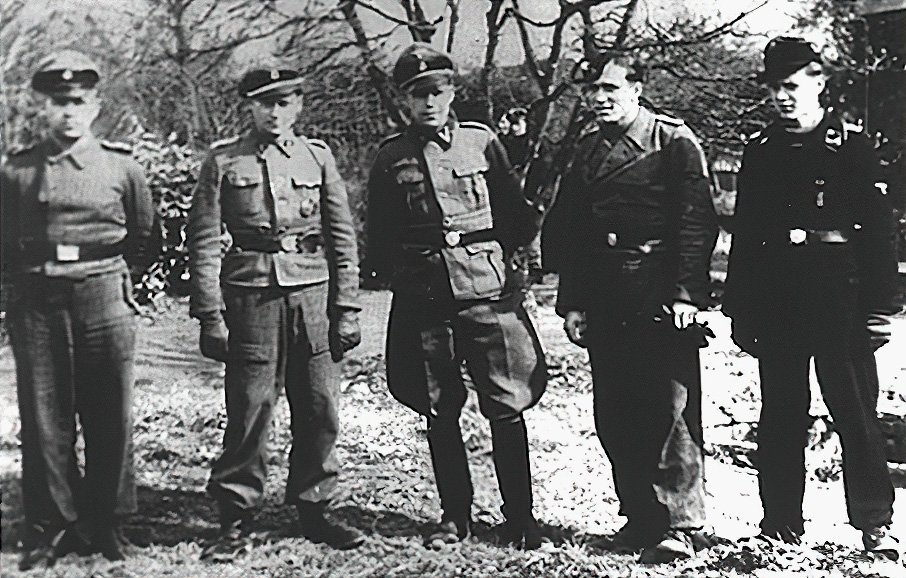
[Above: (from left to right) SS-Hauptscharführer Fritz Stief (Spieß), SS-Untersturmführer Rudi Schwemmlein, SS-Hauptsturmführer Leo Franke, SS-Untersturmführer Hans Quandel and SS-Hauptsturmführer Stratman (possibly).]
It is nice meeting you; my aunt says very nice things. I wanted to ask how you how you became a Waffen-SS soldier?
Leo: Well youngster, it is a long boring story. I was born right before the
first war broke out, so remember nothing of it. I wanted to be a soldier as my
elders were, that drove me since I was very young. When I turned 19, I was
done with school, and would not need permission to join the Heer [another word for Wehrmact, or Army]. I applied
for the old Reichsheer in 1933, Hitler's election opened up the amount that
could join, as it was supposed to be only 100,000.
I served in the Heer for four years and really liked it, but at the same
time there were needs all over the Reich for men to fill good positions. The
police caught my eye and I enlisted as a police officer, I believe it was 1937.
The police by then were under the leadership of a man named Heinrich
Himmler, he was the boss of the SS and Police.
Even though I was a German police officer, I was part of the overall
SS and I liked the idea of the SS. It was the political guard of the nation and
held in very high status.
I was in the police when the war broke out and I wanted to do my
part when a voluntary call up was made of the German police. We were to
be used as a combat arm to help the fighting SS units already being formed.
I spoke to my commander and he approved my release and that set
me on a course in the Waffen-SS. I was sent to the Police Regiment that was
soon formed into the SS Police Division [SS Division Polizei]. We were green, but soon learned to
be an effective combat unit.
How was the Waffen-SS different from the Heer?
Leo: It was not different in the sense of service and training, but the SS was
seen as a private army. It was loyal to only the Führer; it was outside the
chain of the Heer command. Due to this the army did not like the idea of an
armed, combat ready SS.
They fought this in the beginning and made it hard for SS units to
equip and arm. Some did not want competition for the already scarce
equipment.
Himmler did a good job of bypassing the army and getting our own
supplies through loyal companies, and later using the camps to provide insignia, uniforms, and caps. Today they say to be ashamed of that, that we
used prisoners for work, but who in the world does not use prison labor.
In the very beginning, life was hard for us due to the Heer always
interfering and giving orders they had no right to give. In the police regiment
we were tasked with punishing those who broke the laws as well, something
else the Heer did not understand.
They would protest any reprisal against assassins or saboteurs, no
matter what their crime, it is like some approved of their actions.
I saw this in France; there were some non-European soldiers who
were brought into France to fight us. Many of them were very unruly and
quite hard to control; force had to be used on some to get them to listen. I
believe a few were executed for assault on German soldiers, and even French
civilians.
We were trying to fight the enemy, and also keep order and discipline. The
decision was made to let us be combat soldiers first, and then rear area
security second. Russia would be our true test of battle, as we faced a very
massive and hard foe in both the land and soldiers.
I wanted to share that, but in all respects the Waffen-SS and Heer
were the same, in that we fought together, and against the same enemy. We
fought to defend Germany, and to achieve common goals. We had no
animosity towards the Heer, indeed many SS men were former soldiers who
liked the idea of a private political army.
Our training was the same, especially the specialist training. Our
officers were different, there was no snobby, elitist, or "I am wealthier than
you" attitude. We were all equal in the SS, and each soldier was a comrade
first and foremost.
I understand you were a Panzerman, how was your training?
Leo: The SS had schools set up for each field of combat. If you trained with
assault guns you went to [SS-Truppenübungsplatz] Heidelager, signals you went to Nuremberg, for the
Panzers we trained in Bitsch. Each school would last for a couple months on
average, and you had to pass stages of proficiency.
I was given the chance to come to the Panzer arm, and I accepted.
We trained on very early Panzers like the Panzer II and Panzer III. Later on,
in the field we had the Panzer IV long barrel. Because of my past service and
career, I was made a commander of my own Panzer and picked my crew. We
trained in the classroom at first, then moved into the field to work on driving and shooting, to do both was a challenge.
I have to say our training was hard, it took lots of concentration and
learning to work together as a team. I had to direct and manage four men all
at once. We went on to have a very good run of things; I was made
commander of the 6th Company in SS Panzer Regiment 10.
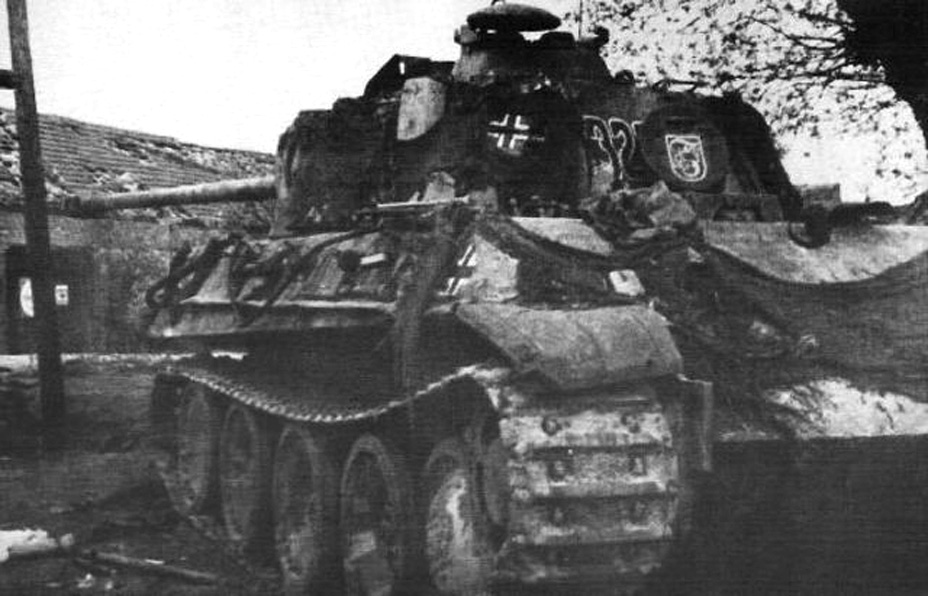
[Above: A Panther of the 10th SS Pz. Div. 'Frundsberg' near Cottbus, April 1945. Note the Frundsberg logo painted on the tank.]
You fought in Normandy, what was that like for you?
Leo: Normandy was a not so good time for me. My regiment was removed
from Poland in June and sent west to fight the Allies. We were puzzled, as
Ivan had launched a large attack. We loaded onto trains and settled in; the
trip took a long time due to Allied air attacks. It was boring, yet we had angst.
The plane attacks kept us all on edge.
This was the trump card the Allies had in their pocket, with the
control of the sky, they could stop daytime movements. We had it good in
the east, the Luftwaffe still had decent control, and we could move. In the
west, it was the opposite; our fighters had been withdrawn to defend the
Reich.
When we arrived, we were moved company by company into
positions, mostly at night. We had resistance to deal with also, lines were
constantly cut, soldiers fired on, and roads mined. The Allies had men
working behind the lines as well. This slowed movements down and made us
watch every turn.
We faced the British first and defended against their breakout
attempts, we worked with the Hitler Youth Division, who had gained quite a reputation
I must say. They were just young kids, but they put fear in the enemy they
faced and held their ground.
The British eventually broke our lines, with the Americans, and
forced us into a pocket where, if it were not for the bravery of the German
soldier, the whole front would have been lost. We were lucky to escape by
the skin of our teeth.
Can I ask you why you lost in Normandy?
Leo: Oh, that is not a simple question youngster, I can share my guess. I know
we were outmatched and heavily outnumbered. I bet you do not know that
the initial landings were only faced by a few hundred 'German' soldiers, many
of whom were Russian and Polish volunteers, of lesser quality.
Yes, the massive landings of thousands of men and tanks were faced
only by a splatter of second-rate soldiers. The only good soldiers in
Normandy were a Panzer division, a paratroop regiment, and the Hitler Youth Division.
These were not allowed to be used in the fighting until after the landings had
happened.
I also believe the generals were lulled by the Allies, and some were quite
incompetent. Of course, today they get to blame the Führer, claiming he was
the one who lost the war, but I do not think so. If the Panzers were near the
beaches, and there was freedom of action, we may have beaten the landings
back and prevented a foothold.
It is testament to our arms that it took the Allies two months to break
our lines, and that was with using naval guns, aircraft, and partisans. We had
good luck against their armor, the Sherman was easy prey to our guns, and
I saw many blown up wrecks. However, our Panzers were just as vulnerable.
We could just as easily be knocked out so there was no German superiority
of armor.
Only the Tiger could take punishment, and it was prone to the
heavier velocity weapons. Overall, we had far too few of the heavy tanks that
could have made a difference. Some regiments used old French and Russian
Panzers, which shows how thin we were. Add to this the Allied supply
superiority, and we could not hope to win.
In Normandy the front was always active due to the Allies being able to
lob shell after shell at German positions. I will tell you of an incident I saw
that shows the recklessness of this. We tried to stay away from any occupied town, farm, or village. Many of the civilians refused to leave, so we had to
be careful of where we took up defensive positions. Of course, sometimes
this was not always possible as your enemy can dictate the field.
We were defending a road, which had a nearby farm. The British
opened up with artillery, deliberately striking the house to get a better field
of view. In doing so they killed a family who was hiding in the cellar. Our
men went to help them after the shells stopped and pulled them out for burial
right when Tommy [slang for British soldiers] attacked.
I noticed that the Allies did not care about culture or treasures.
They fired on any house, barn, or building they thought contained the enemy.
This was reckless and against the rules of war. They could do this because
they had an abundance of ammunition they could freely use.
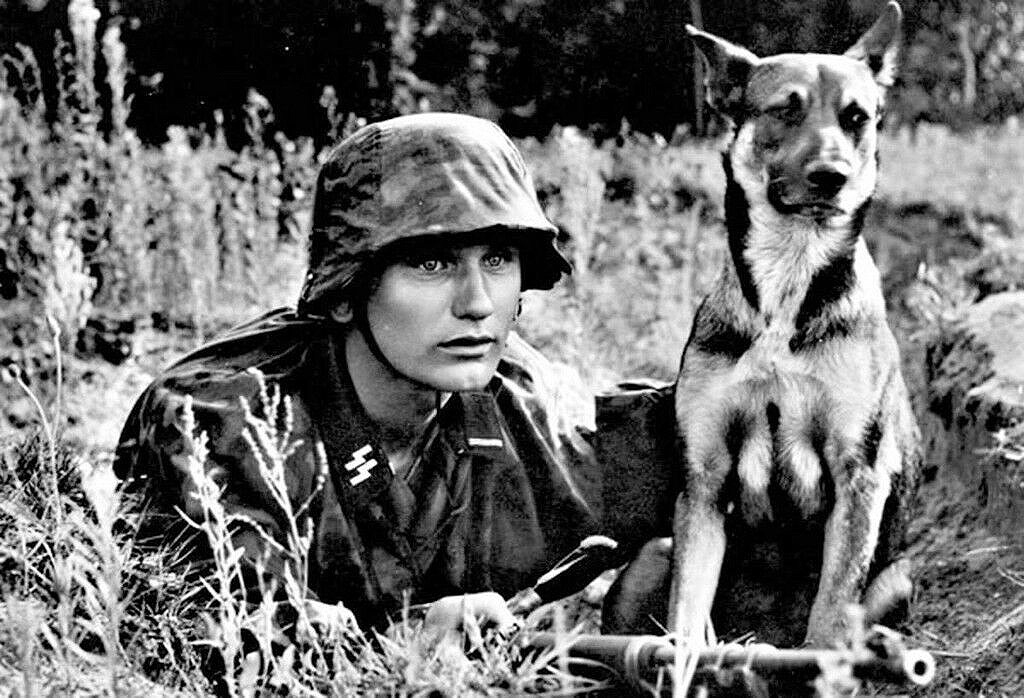
[Above: Men of the SS valued such 'outdated' ideals like honor, chivalry and respect to your enemy, unlike many of their enemies.]
I understand you won the high honor of the German Cross in Gold, what
was that like?
Leo: Yes, I was given this medal at war's end, as a matter of fact SS-Sturmbannführer [Ernst-Johann] Tetsch made the recommendation. I believe you have plans
to meet him at some point. At war's end, things were very disorganized and
confused. I was given the award more for successful completion of orders,
and just surviving.
I was a holder of the Iron Cross, Honor Roll Clasp, and finally the
German Cross in Gold. It was a very high award, and I was honored to be a
bearer. I wear this award today as a reminder of the courage of the men I had
the honor to serve with. I am afraid I cannot say any more as the war ended
as I was confirmed [for the medal]. There was no more action for me.
Do you believe the Waffen-SS committed any of the crimes the Allies say you
did?
Leo: In the most intense words I can think of, certainly not. War in and of
itself is a crime against everything. I cannot trust the Allies to be honest, and
never will. They still occupy my homeland and allowed the Soviet Union to
be formed with a large curtain. Countless victims today lay in silent graves
due to the hate the war spawned.
Sure, there were bad soldiers on our side, every army has them. But
I will go to my grave stating we did not commit crimes on the scale that they
say we did. It is possible the isolated prisoner was shot while
surrendering, but this was very rare. We had very strict orders to take prisoners due to the intelligence
they gave, and to be civil to the non-combatants. Never did I see any
misdeeds by our side against anyone.
I can say that the claims made against us should have had a very fair
and balanced review. The enemy just let anyone make claims and then they
acted on them.
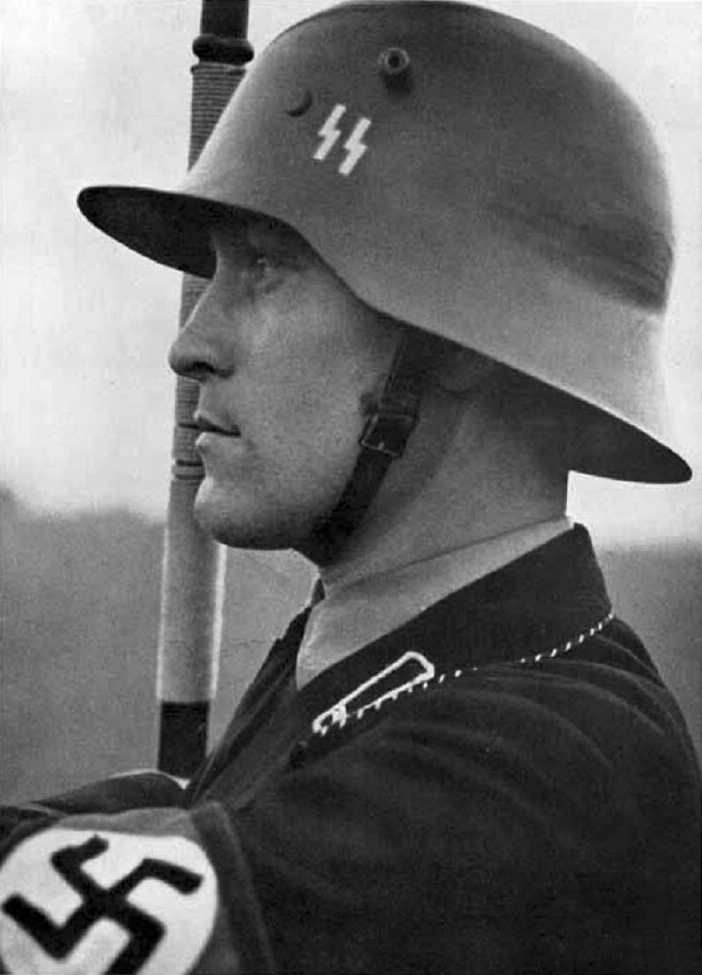
[Above: An early photo of an SS knight holding his flag, which represented everything the current world is sharply against, amongst these lofty ideals are: truth, valor, charity, chivalry, goodness, respect, family and traditional values.]
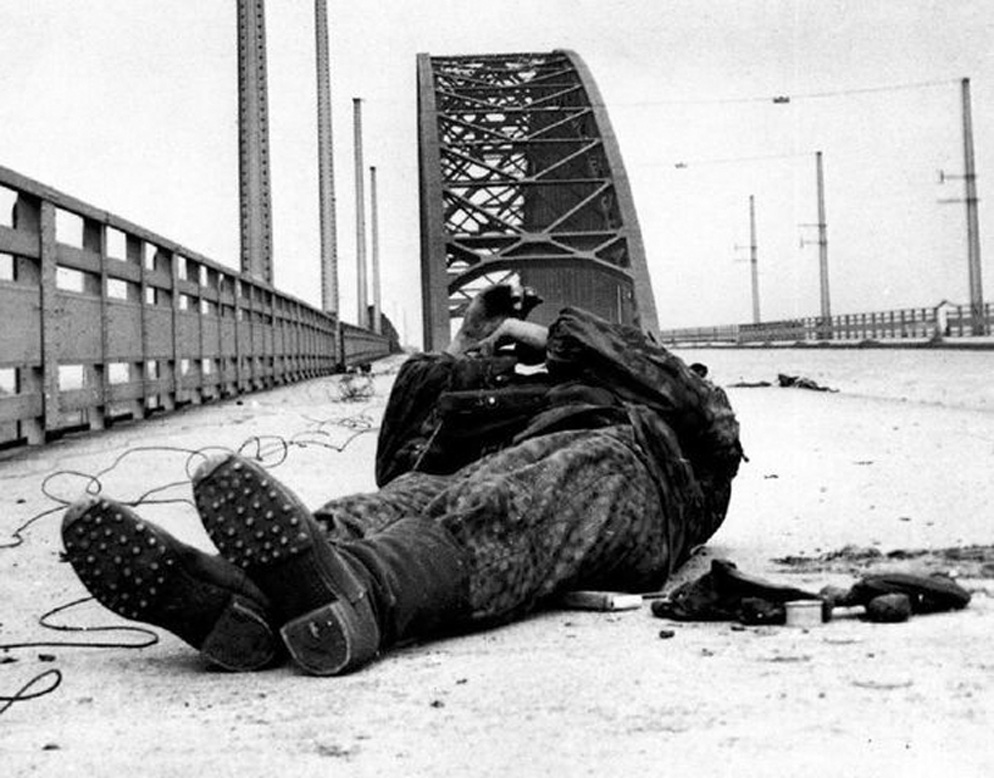
[Above: 'Frundsberg' soldier shot at the Nijmegen bridge, September 1944. This was the site of violent battles during the Allied 'Market Garden' operation, which resulted in massive Allied casualties and failure of the operation.]
Back to Interviews








